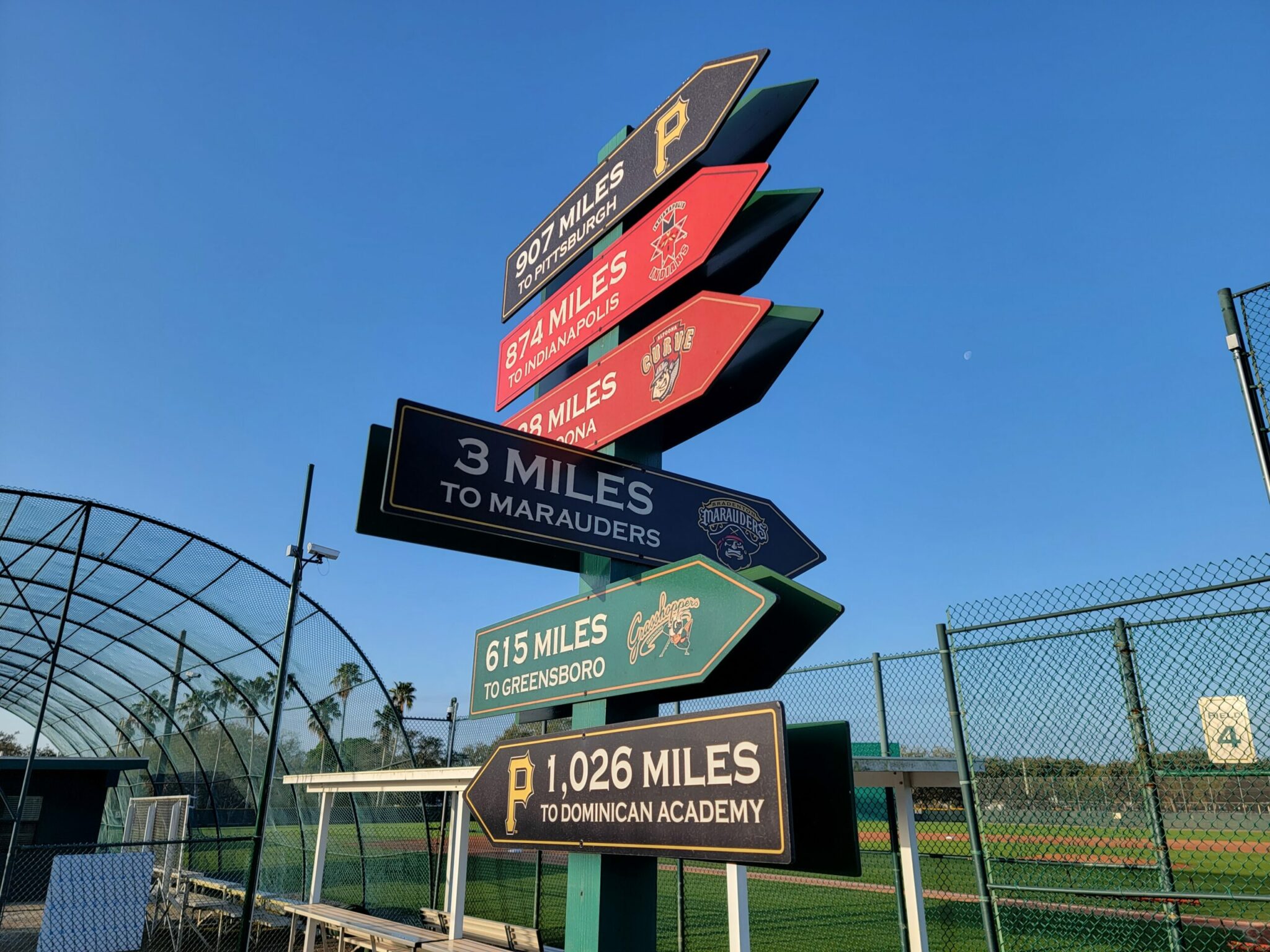BRADENTON, Fla. – In 2006, John Baker got his first trip to Major League Spring Training with the Oakland Athletics. The former catcher and current Pirates farm director went 10-for-20 with a 1.242 OPS in his debut, and it was at that point that Baker said he felt like a Major League player for the first time.
“It took a long time for me to see myself as a Major League player,” said Baker. “It took me five years of minor league baseball for me to think ‘You know what, I think I can actually do this.’”
Baker originally was a walk-on with Cal, where his original plans weren’t to be a professional baseball player, but to go to law school and become an attorney. He was drafted in the fourth round of the 2002 draft — famously known as the Moneyball draft for the Oakland Athletics — and the rest was history. Baker was traded to the Marlins prior to the 2007 season, made his MLB debut in 2008, and spent parts of the next seven years in the big leagues.
Now, Baker’s job is to lead the development of 180 minor league players in the Pittsburgh Pirates system, helping as many as possible realize that they can also be Major League players, ideally before they arrive in the majors. For that goal, he’s taking a page out of the Oakland playbook.
“What you’re seeing on this field, the way these players are treated, incredibly consistent to the Oakland A’s and Keith Litman were running things all the way back in 2002,” said Baker of Pirates minor league camp when I spoke with him last week at Pirate City.
The Pirates have been offering a new, player-centric development approach for their minor leaguers. I outlined part of that system last week, highlighting Vic Black’s new pitching video library. The goal across the board is to give players several options to achieve the desired development goal, and allow them to pick the task that feels best for them.
The options for development are a big change from the past, where minor league development was a top-down assignment, rather than a collaborative process. The biggest change from the past has been treating the players like adults, or as Baker puts it, like “human beings.”
“I’ll never forget going into the first day [of camp with Oakland], I was calling people coach and they were going ‘No, call be by my first name.’ That really struck me with that organization,” said Baker. “They were putting the human being first.”
Baker noted that for all of the hype surrounding the Moneyball tactics, and the executives in baseball, a huge factor for Oakland’s success over the years came from their player development system.
“What we don’t hear a lot about was how many really good Major League players those Oakland A’s player development groups created,” said Baker. “A lot of the guys that I was drafted with had good Major League careers. It is directly representative of an environment like this, and the influence of Keith Litman on professional baseball.”
The Pirates have seen good results so far with this new approach. They didn’t have any issues with players showing up on time, or showing effort in games or practices last year in the first season under the new system. That gave them confidence that they could run a minor league camp with a Major League feel, and trust that each player would get their work done.
“[Oakland] built this environment of intrinsically motivated people in the fabric and the structure that they did things,” said Baker. “It’s the same thing that we’re trying to replicate here. For you to feel like you have the motivation you need, you have to feel like you have a choice. If I tell you what to do all the time, it’s now my idea you’re trying to live out. I already had my time for my dream. It’s not about me.”
Baker brought up Mason Martin as an example, saying it’s about his dream and the dream of players like him. I covered some of what Martin was working on last week.
“What does he want to do, how does he want to get there, and how do we support that?” asked Baker. “How do we build a structure around him to get him to the major leagues, so we can see him hitting balls in the river. That’s what we want. We want to support the dreams of the players.”
THIS WEEK ON PIRATES PROSPECTS
John Baker is Building a Player Development System Modeled After the Oakland Athletics
The Pirates Will Be Introducing All Of Their Minor League Position Players to Secondary Positions
Pirates Prospects Who Could Be Most Affected By an Extended MLB Lockout
The Odds of Successful Dominican Summer League Hitters Making it to the Majors
A Pair of Pirates First Round Picks Leading the Way
Endy Rodriguez: Toolbelt Runs Deep, Both In The Field And At The Plate
Under the Radar: Three More Sleeper Prospects To Follow in the Pirates System in 2022



